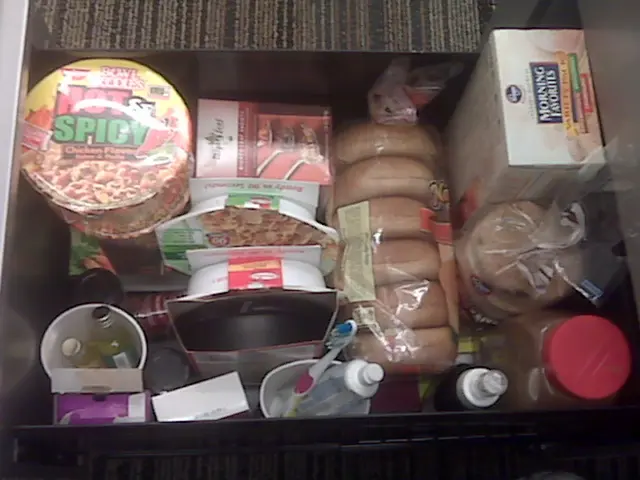When does diarrhea turn critical with noroviruses, EHEC, and other causative agents?
In the event of experiencing diarrhea, it's essential to understand the appropriate steps to take for effective management and prevention of dehydration.
Firstly, it's advised to avoid constipating medications during diarrhea, as they may potentially prolong the illness, according to the health advice website, Infektionsschutz.de. The bacteria Salmonella, campylobacter, EHEC, rotavirus, and norovirus are common culprits for causing diarrhea.
To cope with diarrhea, it's crucial to replenish lost liquids and essential mineral salts. Severe dehydration, which can occur due to diarrhea, requires prompt attention and is often balanced out by infusions. A good combination suggested by gesund.bund.de is sweetened tea and salted crackers.
In cases of severe diarrhea, special electrolyte solutions can be beneficial, as advised on gesund.bund.de. For instance, the World Health Organization (WHO) recommends a solution for diarrhea: mix four teaspoons of sugar, three-quarters of a teaspoon of salt, 250 milliliters of orange juice, and one liter of mineral water.
Persons particularly at risk from a severe diarrheal illness include newborns, elderly individuals, people with weakened immune systems due to disease or medications, and pregnant women. These groups are more vulnerable to complications such as severe infections and complications like hemolytic uremic syndrome (HUS) in EHEC infections.
It's crucial for these vulnerable groups to consult a doctor or physician early if they experience diarrhea. Symptoms such as severe circulatory problems, muscle cramps, lethargy or confusion, high fever, blood in stool, if diarrhea persists for more than three days, or if they are unsure about their symptoms, warrant medical attention.
Birgit Terjung, spokesperson for the German Society for Gastroenterology, Digestive and Metabolic Diseases (DGVS), states that a very dry tongue and severe headaches are warning signs of critical fluid loss. A skinfold test can be a crucial clue for dehydration, where a skinfold remains when let go.
In the UK, the Patient Navi of the medical on-call service can help assess the appropriate medical care in case the GP's practice is closed. This service can provide valuable assistance in managing symptoms and ensuring prompt medical attention when necessary.
In conclusion, proper management of diarrhea involves maintaining hydration, seeking medical advice when necessary, and being aware of symptoms that may indicate severe dehydration. By following these guidelines, individuals can effectively manage diarrhea and prevent complications.
Read also:
- Peptide YY (PYY): Exploring its Role in Appetite Suppression, Intestinal Health, and Cognitive Links
- Toddler Health: Rotavirus Signs, Origins, and Potential Complications
- Digestive issues and heart discomfort: Root causes and associated health conditions
- House Infernos: Deadly Hazards Surpassing the Flames




